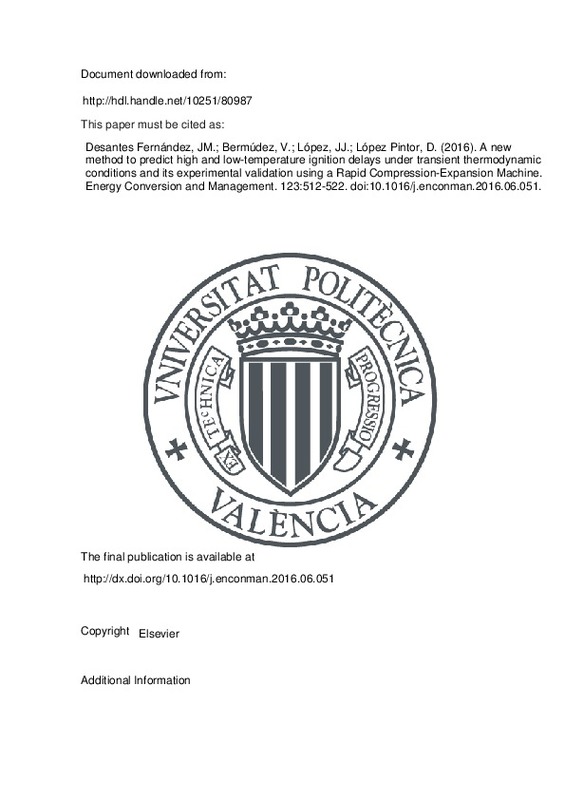JavaScript is disabled for your browser. Some features of this site may not work without it.
Buscar en RiuNet
Listar
Mi cuenta
Estadísticas
Ayuda RiuNet
Admin. UPV
A new method to predict high and low-temperature ignition delays under transient thermodynamic conditions and its experimental validation using a Rapid Compression-Expansion Machine
Mostrar el registro sencillo del ítem
Ficheros en el ítem
| dc.contributor.author | Desantes Fernández, José Mª
|
es_ES |
| dc.contributor.author | Bermúdez, Vicente
|
es_ES |
| dc.contributor.author | López, J. Javier
|
es_ES |
| dc.contributor.author | López Pintor, Darío
|
es_ES |
| dc.date.accessioned | 2017-05-11T11:33:08Z | |
| dc.date.available | 2017-05-11T11:33:08Z | |
| dc.date.issued | 2016-09-01 | |
| dc.identifier.issn | 0196-8904 | |
| dc.identifier.uri | http://hdl.handle.net/10251/80987 | |
| dc.description.abstract | A new procedure to predict both high-temperature stage and cool flames ignition delays under transient thermodynamic conditions has been developed in this paper. The results obtained have been compared with those obtained from the Livengood & Wu integral method, as well as with other predictive methods and with direct chemical kinetic simulations and experimental data. All simulations have been performed with CHEMKIN, employing a detailed chemical kinetic mechanism. The simulations and predictions have been validated in the working range versus experimental results obtained from a Rapid CompressionExpansion Machine (RCEM). The study has been carried out with n-heptane and iso-octane, as diesel and gasoline fuel surrogates, under a wide range of initial temperatures (from 358 K to 458 K), initial pressures (0.14 MPa and 0.17 MPa), compression ratios (15 and 17), EGR rates (from 0% to 50%) and equivalence ratios (from 0.3 to 0.8). The experimental results show good agreement with the direct chemical kinetic simulations and with the new predictive method proposed. In fact, the mean relative deviation between experiments and simulations is equal to 1.719% for n-heptane and equal to 1.504% for iso-octane. Besides, the new method has shown good predictive capability not only for the hightemperature stage of the process but also for cool flames, being the mean relative deviation versus the experimental data lower than 2.900%. Better predictions of the ignition delay have been obtained with the new procedure than the ones obtained with the classic Livengood & Wu expression, especially in those cases showing a two-stage ignition pattern. | es_ES |
| dc.description.sponsorship | The authors would like to thank different members of the CMT-Motores Termicos team of the Universitat Politecnica de Valencia for their contribution to this work. The authors would also like to thank the director of LAV-ETH, Konstantinos Boulouchos, for the Dario Lopez-Pintor's internship at LAV. Finally, the authors would like to thank the Spanish Ministry of Education for financing the PhD. Studies of Dario Lopez-Pintor (grant FPU13/02329). | en_EN |
| dc.language | Inglés | es_ES |
| dc.publisher | Elsevier | es_ES |
| dc.relation.ispartof | Energy Conversion and Management | es_ES |
| dc.rights | Reserva de todos los derechos | es_ES |
| dc.subject | RCEM | es_ES |
| dc.subject | Ignition delay | es_ES |
| dc.subject | Autoignition modeling | es_ES |
| dc.subject | Fuels | es_ES |
| dc.subject | Chemical processes | es_ES |
| dc.subject.classification | MAQUINAS Y MOTORES TERMICOS | es_ES |
| dc.title | A new method to predict high and low-temperature ignition delays under transient thermodynamic conditions and its experimental validation using a Rapid Compression-Expansion Machine | es_ES |
| dc.type | Artículo | es_ES |
| dc.identifier.doi | 10.1016/j.enconman.2016.06.051 | |
| dc.relation.projectID | info:eu-repo/grantAgreement/MECD//FPU13%2F02329/ES/FPU13%2F02329/ | es_ES |
| dc.rights.accessRights | Abierto | es_ES |
| dc.contributor.affiliation | Universitat Politècnica de València. Escuela Técnica Superior de Ingeniería del Diseño - Escola Tècnica Superior d'Enginyeria del Disseny | es_ES |
| dc.description.bibliographicCitation | Desantes Fernández, JM.; Bermúdez, V.; López, JJ.; López Pintor, D. (2016). A new method to predict high and low-temperature ignition delays under transient thermodynamic conditions and its experimental validation using a Rapid Compression-Expansion Machine. Energy Conversion and Management. 123:512-522. https://doi.org/10.1016/j.enconman.2016.06.051 | es_ES |
| dc.description.accrualMethod | S | es_ES |
| dc.relation.publisherversion | http://dx.doi.org/10.1016/j.enconman.2016.06.051 | es_ES |
| dc.description.upvformatpinicio | 512 | es_ES |
| dc.description.upvformatpfin | 522 | es_ES |
| dc.type.version | info:eu-repo/semantics/publishedVersion | es_ES |
| dc.description.volume | 123 | es_ES |
| dc.relation.senia | 323457 | es_ES |
| dc.contributor.funder | Ministerio de Educación, Cultura y Deporte | es_ES |







![[Cerrado]](/themes/UPV/images/candado.png)

